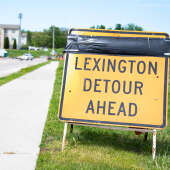Meet Cape Chamber’s new president and CEO

The new president and CEO of the Cape Girardeau Area Chamber of Commerce is familiar with the connotation others make when they learn his surname.
Robert “Rob” Gilligan, who began his tenure as the Cape Chamber leader this month, knows about “Gilligan’s Island,” the 1960s TV situation comedy which continues to live on eternally in syndication.
“I’m fine with references to the show,” Gilligan told B Magazine.
“The audience that seems to get them, though, seems to get smaller over the years — but for those who do get the humor, it’s a good memory and so, it’s a good association.”
Gilligan’s hometown Emporia Gazette newspaper said last month the 44-year-old was leaving to “skipper” the Cape Chamber.
For the uninitiated, “Skipper” was one of the main characters on the 1964-1967 CBS-TV program and a close friend of the show’s protagonist, the aforementioned Gilligan.
Indeed, the Gazette on March 12 called Emporia “Gilligan’s island,” because the Sunflower State native has spent his entire life in Emporia, part of Lyon County in east-central Kansas.
Gilligan, with 20 years’ experience in business and governmental relations, including time as an education lobbyist in Kansas’ state capital of Topeka, was a member of Emporia’s city commission — what the town of 24,343 calls its city council — for more than a decade and also served as the city’s mayor.
Holding an undergraduate degree in fine arts from Emporia State University, Gilligan expects to complete a Master of Public Administration degree through the University of North Carolina this fall.
Until taking the Cape Chamber post, Gilligan was the no. 2 executive for the Emporia Chamber of Commerce and director of Ignite Emporia.
Members of the search team who recommended Gilligan’s hire offered words of praise for the new leader of the Cape Chamber.
* Aaron Panton, Bank of Missouri: “Rob was selected due to his vision for the Chamber going forward and leadership experience,”
* Jeff Glenn, GlennView Strategies: “In a thorough and deliberate search process that yielded strong candidates, Rob articulated a profound understanding of the need for chambers to evolve to remain relevant and add value to their members and communities.”
* Cliff Brooks, Schafer’s Electrical Enclosures: “While Rob has experience working in both local government and a chamber organization in a similar size market to ours, his view of the evolving role of a Chamber of Commerce is complementary with the existing strengths and experiences of the Cape Chamber. Rob’s perspective gives us an opportunity to leverage the strong foundation of the Cape Chamber to continually grow our businesses and our community for the future.”
B Magazine put 12 questions to Gilligan as he arrives to begin his tenure with the Cape Chamber.
Q: What is the allure for you, in mid-life, from leaving a place you know so well to come to Cape Girardeau?
Gilligan: “I’ll be honest that I wasn’t necessarily looking for a new job opportunity. I’ve been on the city commission in Emporia and served three terms as the city’s mayor. When the search firm, Waverly Partners, reached out to me, they said the (Cape Chamber) job matched up well with my skill set. It was intriguing to me because of the relational circles I’ve been part of in terms of technology and entrepreneurship development. I’ve been aware of the innovative things going on in Cape and wanted to check it out. This led to a conversation, which resulted in an interview and a visit. Over that process, seeing the success Cape’s already seen plus future opportunities, really seemed an interesting chance to grow my career and embrace a community in many ways similar to Emporia, where I grew up. It certainly helps that Southeast Missouri State University is there and my significant other, Kelly McEnerney, is an assistant professor of psychology at Emporia State University. She is hopeful of making a transition to SEMO. The potential for career opportunity for both of us made us look seriously at Cape Girardeau.”
Q: Rob, you are following a president & CEO, John Mehner, who led the Cape Chamber for nearly three decades. The head of the search team looking for Mehner’s successor said, “We’ve got big shoes to fill.” When you reflect on taking a job held for so long by one person, what are your thoughts about the challenge you face following him?
Gilligan: “‘Big shoes to fill’ is an appropriate descriptor after (Mehner’s) 28 years of history and success in this role of leadership in the community. For me, it’ll be both about coming in and understanding the culture and opportunity that’s been built, and also trying to define my own path as I bring different skills to the role.
“Resiliency is a critical piece for organizations like chambers of commerce.
“This transition is certainly an opportunity, and I’m looking forward to the challenge.”
Q: What do you mean by the word “resiliency?”
Gilligan: “Anytime you’ve been through a change or a shift, resiliency is the ability to recover from the change and move forward. When you’re talking about changing leadership after 28 years, any organization is going to be affected in some way and not necessarily in a negative way. Tradition, history and connectivity are all impacted. My goal in coming in will be to do my best to connect to the community, the members of the chamber of commerce and to listen. The aim is to build on those 28 years of success and to move (Cape Chamber) forward. To me, that’s what I mean by a resiliency model. The future is bright and we can work together to make it even better.”
Q: I’ve heard about leaders who come into a new situation and vow to immerse themselves into the culture and not do anything of impact for 90 days. Others are ready to implement change on day one. How would you characterize your approach to the job?
Gilligan: “Ninety days, one quarter of the year. is a good easy answer, right? We measure presidents after 100 days.
“I’ll be looking for feedback and information as I begin from community leaders, chamber members and staff.
“There’s a vision established, a way forward, and there’s a belief I can be the one to follow that plan and execute it.
“Having conversations, connecting with the community and learning more is definitely my first task. Ultimately, I come to Cape Girardeau with fresh eyes and maybe some new perspectives and ideas. The chamber is the organizational voice for its membership. Making sure I can connect and understand the desires, hopes and goals of chamber members will help set the direction.
“Actions follows knowledge and hopefully, that knowledge will come at a good pace.”
Q: What do you do well? In other words, what special skill set do you bring to the chamber?
Gilligan: “One of my strongest skills is consensus or coalition-building. I’m a big believer that organizations only have so much capacity to move things forward. Through partnerships, collaborations and cooperative effort, we can do bigger and better things.
Q: What is your take on thinking regionally when it comes to economic development? In other words, if Sikeston gets a manufacturing plant, it’s good for the whole region and we should celebrate, rather than lament that the facility didn’t come to my town. Drilling down, there are people from “your backyard” that will likely work there. What is your attitude to the notion of ancillary benefits for Cape Girardeau even if a company chooses to locate elsewhere in Southeast Missouri?
Gilligan: “I agree 100%. Cape is certainly the anchor of the region. It’s the health hub, educational hub, retail hub and one of the main job hubs. Cape’s importance goes beyond Southeast Missouri. You have to remember Southern Illinois, Western Kentucky, Northeast Arkansas and Northwest Tennessee. If we can support and create opportunity anywhere in the larger region, Cape and the chamber of commerce will benefit. I do believe in a broader strategic plan and approach to growing the overall area.”
Q: What is Ignite Emporia, the organization you lead as executive director?
Gilligan: “Ignite Emporia was launched by Emporia’s chamber of commerce in 2019. It was envisioned as a five-year community investment effort aimed at spurring job growth, workforce readiness, affordable housing and also helping existing businesses expand. What we discovered initially through Ignite is a shortage in available workforce to match up with current needs of our business community. We learned it is harder and harder to find residential property. Emporia has a Main Street organization — as Cape does — targeted at small businesses. The city also has an economic development arm for large industry but those folks who were in the middle of those two felt a bit unsupported.
“Ignite said to our business community, ‘If we put forth effort in this middle range, would you support it with financial investment?’ We did a capital campaign with the support of those partners and raised $1.2 million to create the Ignite initiative. I came on as director at that point.
“One of the problems we discovered during my time at Ignite is we didn’t have any lots available for building. We’ve been focused on securing land and developing a plan for lots after doing a comprehensive housing study. We’ve got a subdivision we’re getting ready to open up — 53 buildable lots in the $200,000 to $250,000 price range — for new construction.
We also looked at business retention but about a month into me taking the job, the pandemic started and we dramatically shifted into helping businesses cope with the impacts of COVID-19.
“In the last 12 months, again pandemic-driven, we worked on increasing access to childcare to support allowing entry into the workforce. Similar to the situation in Cape, Emporia needed more people available to work open jobs.”
Q: Cape Girardeau MAGNET has identified as a priority keeping 25-to-44-year-olds in the region, rather than seeing them leave for bigger markets such as St. Louis and Nashville. Magnet commissioned a Regional Competitive Assessment compiled by the consultant firm Ernst & Young, which included information on how the region seems to be losing that key age group. What ideas do you have for trying to keep a younger demographic rooted to this area?
Gilligan: MAGNET’s assessment was shared with me, and I’m glad that analysis has been done. Being a college community, as both Cape and Emporia are, you attract 18-to-22-year-olds who are seeking an undergraduate degree and perhaps graduate-level education beyond that. We’ve got a chance to engage those young people, but the trick is how to keep them when you’re in competition with larger cities with more amenities and frankly, more excitement, for a person in his or her 20s.
“Two things that impressed me right off the bat about Cape Girardeau that goes directly to your question.
* “One, the work being done at Codefi, the economic development incubator embracing new opportunity with a tech focus.
* “Two, the amount of growth and investment in local amenities I’ve observed in Cape just in my limited visits and by paying attention to local media.
“Six years ago, I happened to be at the National League of Cities conference in Nashville. One of the keynote speakers was now-president Joe Biden. I remember him saying that in the future, communities that succeed will have three things to which they gave priority attention: education; infrastructure; and quality of life.
“People are going to choose to be in places where they feel the educational system supports their children; where the physical infrastructure, including healthcare, is in place; and a quality of life they want to be a part of.
“Those three notions Biden mentioned, for me, has been a driving idea for the work I’ve done in Emporia.
“In attracting, keeping and attracting a future workforce, it’s important we have the elements they’re looking for and want.
“Cape Chamber, Magnet and the region can be partners by focusing on those three things.
Hopefully, we can stem the tide Ernst & Young has identified, where we lose the desired younger demographic, by providing the opportunities they’re looking for in a community they want to be a part of.
“The pandemic’s aftereffects may give rural, regional communities like Cape Girardeau a new opportunity as people look to reconnect with others in a smaller, more accessible area.
Q: Let’s circle back to the availability of land, which you mentioned was an issue for Ignite Emporia. Cape MAGNET has identified the lack of large tracts as problematic in attracting industry. How do you propose to address this?
Gilligan: “We had a similar organization to MAGNET called Regional Development Association (RDA) focused on large-scale business and industrial recruitment and development.
Developing industrial parks is one strategy. Purchasing land options, where we can hold tracts for significant periods of time, is another. One of the struggles is investing resources now that may or may not pay off for years or even decades.
“We need to make sure we’re ready when the right opportunity presents itself. All communities trying to grow their business opportunities deal with this. When there are only so many resources, how do you pick and choose where to dedicate them and make those investments?
“I’ll be honest. Not knowing exactly what all the tools and resources and strategies Cape has in place, I’ll have to dig into this when I arrive.”
Q: John Thompson, interim director of Cape MAGNET, who recognizes these limitations we’ve discussed, has said Cape is currently not in the position of being able to lure a “big trophy” business like a Proctor & Gamble — which needs a lot of space. Are you suggesting a new look at land options so that when the time comes in the future, Cape is in a position to provide a large business enough room to locate here?
Gilligan: “I need to do more digging to really understand the landscape that exists and to figure out, with the help of all stakeholders, what makes sense for the region as a whole.
A groundbreaking, a ribbon-cutting, for a big trophy company promising 1,000 jobs, big money investment — that’s great. No question.
“You have to consider the amount of time, investment and resources spent on trying to lure a very large business compared to existing business and helping them grow.
“What I’ve seen, time and time again, is many communities will focus on luring the large greenfield developments when if they invested as much effort and energy into working with local business and industry already here, we can achieve the same scalable amount of investment, job creation and growth with local partners than we could ever hope to see by competing with communities all across the country.
“A critical conversation is identifying where success can come locally, where gaps and opportunities are.”
Q: What does the word “progress” mean to you?
Gilligan: “We have to identify priorities as an organization from which we can establish some sort of metric to measure how we are achieving goals. As we move along that line, both short-term and long-term, the progress is what we achieve there.
“Progress can look different to people and that’s based on expectations.
“We need to make sure we have a common, shared language of what the priorities are and be on the same page. This is critical to define progress.
“Progress won’t come easily if it’s one organization doing all the heavy lifting.
“Agreement on the priorities and goals is critical.
“I’m not sure, in Cape, what progress looks like just yet.
“Ernst & Young’s study can help us with that as will community assessments.
“Those conversations early on can help us set a strategic vision, a strategic plan, to measure progress.
“Strategic plans can have real value as long as you design them as a road map, but they can also be documents you spend a lot of money on and put them on a shelf.
“Everybody in the country seems to have the most expensive shelf on their bookshelves which are study after study that they’ve hired consultants to produce.
“The communities who succeed take those studies and use them as action plans.
“Yes, get a plan, but then — how are we going to change?”
Q: What is your “elevator speech” about your vision to lead Cape chamber?
Gilligan: “A great question. I’ve been involved as a judge in an entrepreneurial contest at Emporia State and we challenge students to develop an elevator speech, which makes them sharpen their language. I would say this: I believe Cape is a community with a lot of great success and potential for the future. Chambers of commerce are in a position to evolve and change to help community-wide efforts to embrace new strategies and new approaches for growth and success. My hope is the Chamber board saw in me the skill set and ability to look to the future and design a long-term systemic change for growth strategy that will be successful for years to come.”

































Respond to this story
Posting a comment requires a subscription.